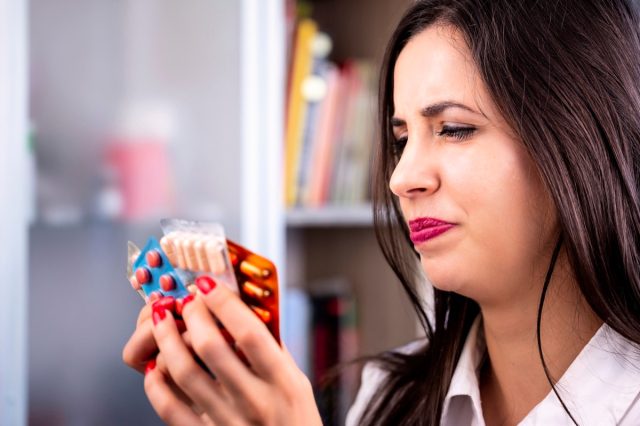There's no shortage of supplements on the shelves promising miracle cures and instant weight loss, but not all work. In fact, some are not as safe as you think and can actually cause harmful side effects and pose hidden health dangers. Eat This, Not That! Health talked with experts who explain what to be aware of before taking supplements and which ones to stay away from.
What Should People Know Before Taking Supplements

Reda Elmardi, a Registered Dietician, Certified Nutritionist, Certified Strength and Conditioning Specialist Trainer and owner of thegymgoat.com explains, "Supplements are not regulated by the FDA. This means that they are not tested for safety before being sold to consumers. If something goes wrong, there is no way to know if it was caused by the supplement or the manufacturer. In addition, many manufacturers do not disclose what exactly is in their products. Many supplements contain ingredients that have been proven to cause harm. Some examples include caffeine, ephedra, and other stimulants. Others may contain harmful amounts of iron, zinc, magnesium, or vitamins A, D, E, K, and B12. Supplements can interact with medications. This is especially true for those who use prescription drugs. Taking certain supplements at the same time as your medication could lead to serious side effects. Supplements can interfere with your body's natural processes. When taken without medical supervision, supplements can cause unwanted reactions in the body. They can affect how your body metabolizes food, hormones, and even medications."
Glucosamine Sulfate

Elmardi explains, "Glucosamine sulfate is a natural product derived from shellfish. It is often included in dietary supplements marketed to help people with joint pain associated with osteoarthritis. But glucosamine isn't helpful for everyone; some research suggests it might even cause problems like stomach ulcers and kidney stones."
Vitamin A

Dr. Seema Bonney, the founder and medical director of the Anti-Aging & Longevity Center of Philadelphia says, "Vitamin A high intakes of some forms of vitamin A can be harmful. Taking more than 10,000 IU vit A daily long term increases risk of osteoporosis. Getting too much preformed vitamin A (usually from supplements or certain medicines) can cause dizziness, nausea, headaches, coma, and even death. High intake of preformed vitamin A in pregnant women can also cause birth defects in their babies."
Elmardi adds, "Vitamin A is a fat-soluble vitamin that is necessary for vision, reproduction, bone formation, immune function, and skin health. However, too much can cause toxicity, especially in children. In fact, 1/3 of the world's population has some degree of vitamin A deficiency."
Creatine

"Creatine is a naturally occurring substance that occurs in meat and fish," Elmardi shares. "It has been used by athletes for years due to its ability to increase muscle mass. However, creatine can be dangerous if taken in large doses. This supplement is not regulated by the FDA and contains ingredients that have not been proven safe. Some of these include L-carnitine, beta-alanine, and taurine. These substances may cause serious health problems."
Vitamin B6

Vitamin B6 is important for brain development and keeping the immune system healthy, but Dr. Booney states, "Excessive amounts of vitamin B6 can produce peripheral neuropathy."
Vitamin E

Vitamin E is important for helping maintain good vision and the health of your blood and skin, but according to Dr. Bonney, " Vitamin E in doses greater than 400 units daily has been associated with a higher risk of all causes of death."
Garlic, Ginger or Ginkgo Extracts

Garlic and ginger can provide anti-inflammatory benefits, but Dr. Booney says, "Garlic, ginger or ginkgo extracts can potentially interact with blood thinners and increase the risk of bleeding."
St. John's Wort

According to Dr. Booney, "St. John's Wort is often taken for depression, but it can interact with other antidepressants being taken at the same time."